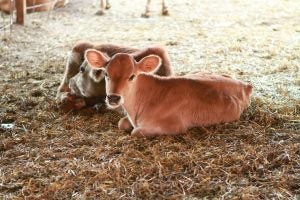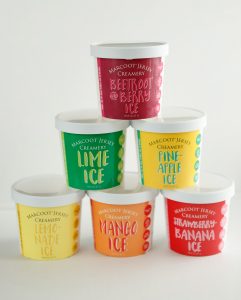Amy and Beth Marcoot’s parents had always encouraged them to leave the dairy, get a degree, and pursue their passions.
So that’s what they did. Both went on to attend the University of Illinois Urbana-Champaign. Amy went after a degree in Physical Education and a then a Master’s in Counseling from Eastern Illinois University. Beth secured a degree in Human Development and a Master’s in Education from Southern Illinois University Carbondale. Both sisters were plugging away in their new careers and hadn’t really considered returning to the family farm.
And then one day, 10 years ago, their parents John and Linda mentioned selling the seventh-generation dairy.
“My parents were trying to plan for the future –the future of the farm,” Beth said. “They knew there needed to be some sort of transition for the farm. We had options my dad told us.”
Those options were to either sell the cows, become a larger farm, or do something to add value to their cows’ milk. The girls chose the third option and decided to enter the field of cheesemaking along with their childhood friend Audie Wall.

“There were several reasons we decided to make cheese,” Beth said. “First, not very many people were processing their own cows’ milk in our region in 2009. Second, we thought we could make great cheese with our Jersey cows’ milk! Also, we wanted to pay tribute to our Swiss heritage.”
So, in 2009, the Marcoot Jersey Farm became known as the Marcoot Jersey Creamery. The 100 head of Jerseys still graze across the family’s 130-acre property. Their dad John still manages the herd. But the family farm has now also become a hot spot for high quality artisan cheeses.
Marcoot Jersey Creamery is a farmstead creamery, meaning their cheese is made solely from the milk from their own registered Jerseys. According to Beth, the Jersey milk is what sets their creamery apart from competition as the higher butterfat and protein makes Marcoot’s cheese very creamy.
Also, the cheeses are all aged in an underground aging cave, designed after the man-made cheese caves in Switzerland, to provide natural aging as well as make the creamery more energy efficient and sustainable.
The ladies have also tried to be resourceful with their cheesemaking. Since they did not have the option in Southern Illinois to sell the whey, a biproduct of cheesemaking, to another manufacturing plant, the girls first started feeding the product back to their steers. Then Cheesemaker Audie came up with an alternative — a whey ice product.

“Since whey is a by-product of cheese, we thought by adding value to the whey we could reach a level of sustainability by making the whey ice,” Beth said.
The whey ice comes in six flavors and contains crushed fruit and fresh sweet cream whey. In addition to three servings of fruit in each pint container, the ices contain 12 percent of the daily protein and 20 percent of the daily calcium needed in a 2,000 calorie diet.
In addition to selling cheese, whey ice, and other farm-raised products, the Marcoot sisters have tried to make the Creamery an experience for their customers. The Creamery is open Monday through Saturday for the public to visit. Guests are welcome to watch cheesemaking through the large viewing windows, visit the calves housed near the creamery, and really see the farm to fork practice in person.
Both sisters say the decision to add on to the dairy business with a creamery wasn’t easy.
“We asked lots of questions and visited many other facilities to get a better idea of what we needed,” Beth said.
“Also, since we were very involved on the dairy, 4-H, and FFA when we were younger- I think that gave us a great foundation for starting the creamery,” Amy said.
It also helped the sisters used a little out of the box thinking before returning to the dairy – something the sisters encourage other young farmers to consider when taking over the family farm.
“I would suggest keep thinking creatively (dairy farmers are good at being creative!) and do your homework,” Amy said. “Be diligent and ask lots of questions!”
To read more about the creamery, see their feature piece in Illinois Farm Bureau Partners Magazine.



